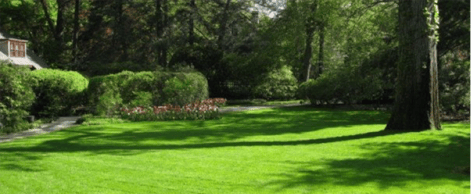Organic lawn care has become a go-to choice for those seeking a healthier, chemical-free approach to maintaining lush, green lawns. However, amidst the growing interest, myths and misconceptions have arisen. In this blog, we'll debunk these common myths surrounding organic lawn care, shedding light on the truth behind this eco-friendly alternative!

Myth 1: Boiling Water Kills Weeds 💦
Truth: While extremely hot water can cause damage to plants, it also doesn't necessarily kill weeds outright.
Pouring water of this temperature directly onto plant foliage or the base of the plant can indeed cause immediate damage. The extreme heat can scorch leaves and stems. Boiling water can certainly cause damage to the delicate root systems, however, it is definitely not the most effective method for long-term weed control. Weeds often have resilient root systems that can regrow after the initial damage.
Myth 2: Beer & Soda Can Be Used As Fertilizer 🍺
Truth: While it may seem promising in theory as a potential source of carbohydrates for plants and soil microorganisms, using beer as a plant nutrient doesn't yield positive results; in reality, it can have adverse effects on plant growth.
Plants are unable to make use of extra carbohydrates, but the soil's microorganisms can. However, the carbohydrates in beer, which are primarily simple sugars, are not suitable for the beneficial microorganisms in the soil, which require complex carbohydrates.
Moreover, alcohol can be harmful to plants. It can be used to intentionally stunt the growth of paperwhite plants, but it must be administered with great care and precision. Excessive alcohol can result in the death of the plant, making it a potentially hazardous substance if not used cautiously!
Myth 3: The Shorter You Cut the Grass, the Less Often You Need to Mow Your Lawn 🚜
Truth: This myth is not accurate at all! In fact, the opposite is true.
Cutting the grass too short in a single mowing session can result in "scalping" the lawn. Scalping removes a significant portion of the grass blades, including the green leaf tissue essential for photosynthesis. This can weaken the grass and make it more susceptible to stress, pests, and diseases.
Short grass allows more sunlight to reach the soil surface, which can encourage weed growth. Weeds tend to thrive in areas with less competition from taller grass blades, and they can quickly invade and overtake the lawn.
_ _ _ _ _ _ _ _ _ _ _ _ _ _ _ _ _ _ _ _ _ _ _ _ _ _
The True Secret to Having a Lush, Organic Lawn (Us!) 🌳🤫
.png?width=445&height=223&name=Happy%20With%20Services%20(3).png)
Our organic turf care program focuses on feeding the soil, not the lawn directly. This allows for the biology in the soil to do its thing and provide a long-duration healthier food source for the grass. As a result, the “feast or famine” of a traditional turf program is replaced with consistent and sustained nutrient availability. Learn for yourself how natural organic lawn care produces the most beautiful backyards and outdoor areas.
Why You Should Make the Switch to Pure Solutions 🍃
- Every year, millions of pounds of harmful, toxic pesticides are used across the United States on home lawns.
- According to the EPA, traditional lawn chemicals can put children and pets at risk.
- Healthy Organic lawns can help offset climate change by sequestering carbon dioxide.
- Organic lawns use less water.
- No leaching of chemicals into valuable drinking resources.
- Natural, organic lawn care produces more stress-tolerant lawns.
Have any more questions? Get in touch with our wonderful office team!
Sources:
https://erbertlawns.com/myths-misconceptions-about-organic-lawn-care/
https://www.realtor.com/advice/home-improvement/organic-lawn-care/

